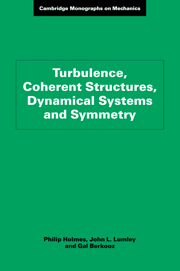5 - Qualitative theory
Published online by Cambridge University Press: 03 February 2010
Summary
This chapter and the following one provide a review of some aspects of the qualitative theory of dynamical systems that we will need in our analyses of low-dimensional models derived from the Navier–Stokes equations. Dynamical systems theory is a broad and rapidly growing field which, in its more megalomaniacal forms, might be claimed to encompass all of differential equations (ordinary, partial, and functional), iterations of mappings (real and complex), devices such as cellular automata and neural networks, as well as large parts of analysis and differential topology. Here our aim will be merely the modest one of introducing, with simple examples, some tools for the analysis of non-linear ordinary differential equations that may not be as familiar as, say, perturbation and asymptotic methods.
The viewpoint of dynamical systems theory is geometric, and invariant manifolds play a central rôle, but we shall not assume or require familiarity with differential topology. In the same way, symmetries are crucial in determining the behavior, and permitting the analysis, of the low-dimensional models of interest, but we shall avoid appeals to the subtleties of group theory in our introduction to symmetric bifurcations. Thus, it should be clear that these two chapters cannot substitute for a serious course (or, more likely, courses) in dynamical systems theory. The makings of such a course can be found in the books of Arnold, Guckenheimer and Holmes, Arrowsmith and Place, or Glendinning, and in other references cited below.
- Type
- Chapter
- Information
- Turbulence, Coherent Structures, Dynamical Systems and Symmetry , pp. 157 - 200Publisher: Cambridge University PressPrint publication year: 1996

